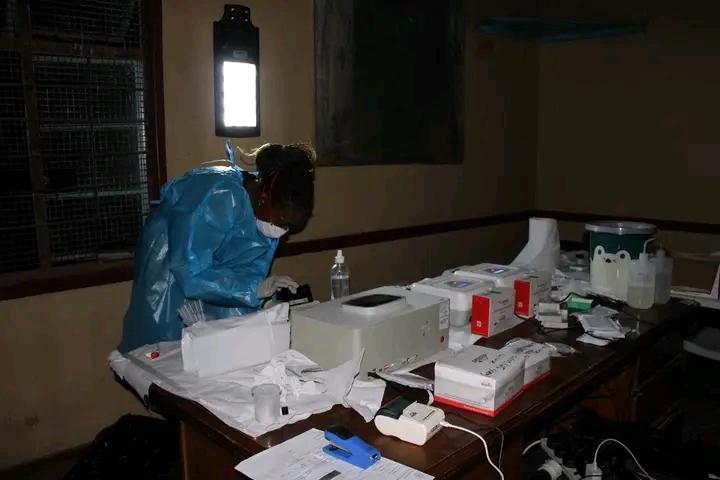By Wallace Mawire
The Union Zimbabwe Trust (UZT) with funding from the Stop TB Partnership (Global) has launched an innovative TB screening outreach project to promote early detection and treatment in high-risk artisanal mining communities of Mberengwa and Zvishavane.
The project, is using a mobile model approach, provides portable sensitive TB screening methods using an ultra-portable digital x-ray enabled with CAD-AI (Computer Aided Diagnosis) that allows real-time interpretation of clients’ x-ray images for abnormalities suggestive of TB and Silicosis. Rapid, field specimen testing for diagnosis, is also part of the project as well as integrated service delivery for other conditions like silicosis, malnutrition and alcohol-use disorders closer to the point of need.
Screening outreaches will be conducted at artisanal small-scale miners (ASM)’s workplaces during daytime and at social drinking points during evenings (moonlight screening), complemented by enhanced routine community screening by trained community health workers. Additionally, screening will be done at primary healthcare facilities where access to X-ray services is currently limited.
“We are here to launch a game changer project in the diagnosis of TB and Silicosis particularly in settings like these mining communities targeting artisanal miners and ex-miners,” said Dr Mary Muchekeza, Midlands Provincial Medical Director, speaking at the inaugural screening outreach at Vanguard Business Centre, a small and busy mining community in Mberengwa District.
“I am aware that, as miners you are very busy – that is why we have come to you, with an x-ray and if you are asked to submit sputum for testing, it will be done here. This reduces the amount of time people previously had to endure, thus, ensuring people get treatment and care much faster.”
The project is being implemented in two districts of Midlands province—Mberengwa and Zvishavane—selected due to their high tuberculosis burden and significant ASM activities. Interventions will be prioritised around twenty-five health facilities’ catchment areas across the two districts.
UZT Executive Director, Dr Ronald Ncube said that, traditionally, TB screening has relied heavily on passive case finding where individuals with symptoms voluntarily present themselves at health facilities for diagnosis and treatment, an approach that often misses high-risk populations who face barriers to accessing care, such as ASMs, people in remote communities, or individuals struggling with co-morbid conditions like alcohol use disorders or malnutrition.
“What sets this model apart, is its integration of TB screening with services for silicosis, malnutrition, and alcohol use disorders, offering comprehensive care closer to where people live and work. By shifting from a passive, facility-based and disease-specific model to a proactive, integrated, and community-focused approach, the project is designed to catch more cases earlier and improve linkage to timely and appropriate care,” he said.
A collective 270 community and health care workers were oriented and trained across five clusters and twenty-five health facilities respectively, equipping them to support community screenings, outreaches and provision of essential health services.
To date, two screening cycles have been done representing four out of 33 campaigns in both Mberengwa and Zvishavane employing both daylight & moonlight screening models. In Mberengwa, Vanguard and Neta business centres, B-mine and Mberengwa Turn-Off were covered while in Zvishavane, Gudo and Vugwi clinics, Samanye, Canada 64, Dhibha and Zuderburg mining areas were covered. Out of 999 clients screened by symptoms, 925 received X-rays, and 271 specimens were collected and processed. These comprehensive screenings led to 10 individuals diagnosed with TB alone, 6 with Silicosis, and 4 with both Silicosis and TB (Silico-TB), highlighting the critical need for integrated diagnostic approaches.
“We are happy to be one of the districts selected to implement the project. It is an opportunity to improve on TB case finding in our communities. This programme, due to the nature of its approach, will empower communities in the fight against TB, bringing us closer to a TB-free Zimbabwe,” said Nkulumo Ncube, Zvishavane District TB and Leprosy Coordinator.
UZT is committed to working closely with the Ministry of Health and Child Care, local authorities and other stakeholders to ensure the sustained success of the project.
The Union Zimbabwe Trust is a scientific organization with a mandate to improve health among marginalized communities in Zimbabwe. UZT exists to promote innovative public health solutions by developing, implementing and evaluating tuberculosis, lung health and non-communicable disease programmes within the framework of national public health priorities in Zimbabwe.
